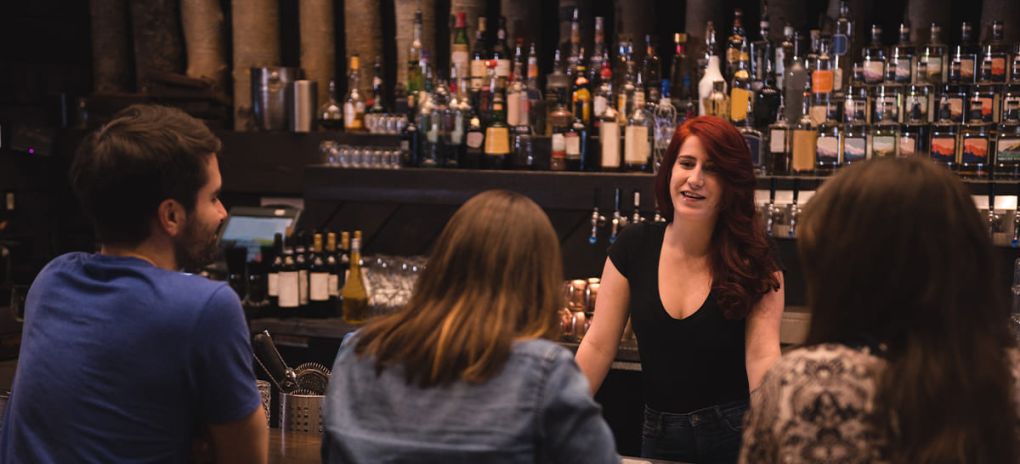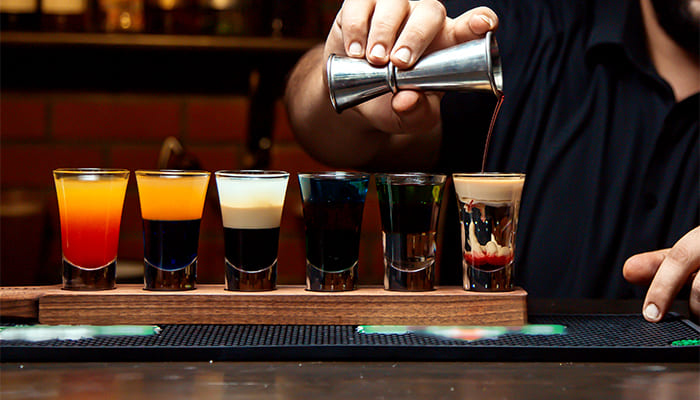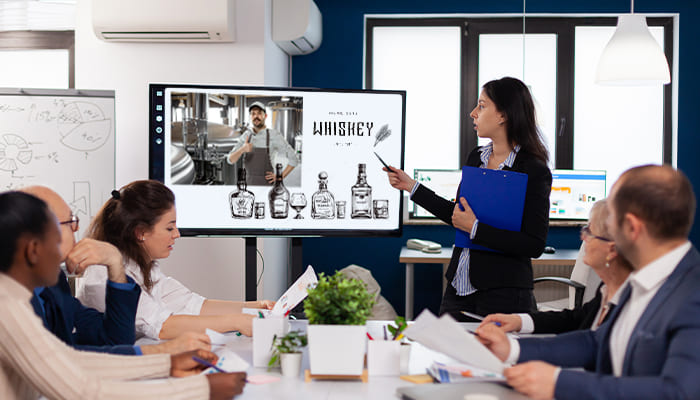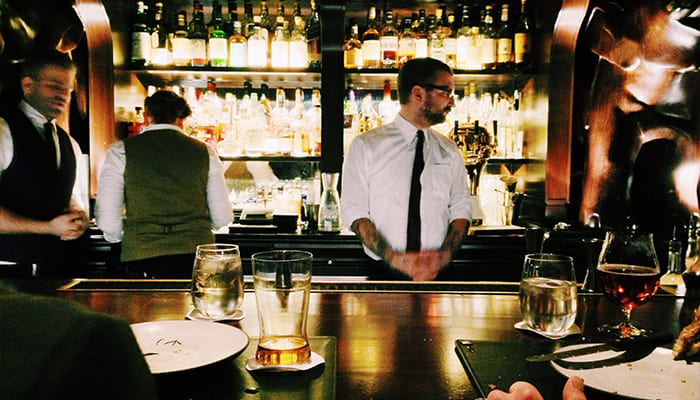
27/09/2021 If you want your craft spirit to have a loyal following then you need to win that loyalty first from bartenders and mixologists. Here’s how to do it.
Gone is the yesteryear when barbacks only stocked the standard fare. Today’s bartenders hold a say in what goes behind the bar. Apart from the classics, they will create room for something new, if it’s something that holds promise to them.
The consumer of today has also evolved. In response, there is an emphasis on high-quality ingredients, curated and customized to please even the most discerning palate. The restaurant or bar’s craft cocktail menu is showcased as a gauge of the bartenders’ skill and an indicator of the restaurant’s status.
The people driving this movement are a nucleus of creative bartenders, bettering themselves every day and changing the bar and restaurant business. They are looking to satisfy people’s desire for something new, different, and exciting with their unique cocktail programs and drinks.
The key point is : How do you ensure that your spirits are on the top of the bartender’s mind when they reach out for a spirit?

1. A deeper knowledge and communication of your own products
Of course, you know your products. You made them. But how well have you developed the knowledge around them? And how much time and effort have you invested in passing on this knowledge to the people who will be selling them, your sales staff, and ultimately the bartenders who will be mixing them for patrons?
Are you telling the story about your spirits effectively? How it was created, what were the ingredients used, and why? How and why did the founders create this spirit brand? What was their thought process behind it?
What do they stand for and what are the brand’s guiding principles? What are the cornerstones of your brand? They could be anything from sustainability, to using local ingredients to giving back to the community. What is crucial is telling that story.
Do your sales staff taste your spirits with the bartenders to experience the nuances of the flavors it brings out? What does your spirit taste good with? What kind of cocktails brings out the best in your spirit and help it shine? Or what mix of ingredients and flavors does your spirit lend itself to really hit it home.

If you have not invested in these, then your spirit brand is an unfinished story. You have not maximized its selling potential.
William Tsui, owner of the Viridian Bar, Oakland, CA says, “We work with brands that we genuinely love. We partner with brands because we want something we won’t be able to get ourselves. When we do work with brands, we focus on getting training programs in place for our bartenders, and we make sure that our bartenders have all the knowledge they need to have about a certain brand or product.”
With so many spirits competing for a limited spotlight on retail and bar shelves, it is essential that your branding strategy differentiates your product from the rest. With the progression of the craft cocktail culture, new market entrants have the chance to make the marketing model their own, they can work it to their advantage and bring innovation to it. Established producers can take this as an opportunity to reinvent their brand image, pivot in a new direction, and redefine their market approach.
Everyone on the sales team, be it yourself or your team or reps should be well-versed with the products they’re pitching. An important aspect is for them to provide training sessions about your brand image and the different characteristics of your spirit and how it would play in with various possible cocktail programs. This ensures a chance for your spirit to enter an account and make a place for itself to stay there.
Explore the use of your spirit together with the plethora of ingredients available today. Try it out with herbs, locally sourced foods, edible flowers, bitters, and syrups to see what brings out your spirit’s unique flavors in a range of cocktails.
Enlisting a professional mixologist experienced in creating innovative and profitable cocktail programs would give your spirit a definite edge. Professional mixologists and bartenders know how to accentuate and present the unique flavors of your products. They can demonstrate how they can blend in successfully to create profitable cocktail menus in the real world, bridging the gap for applicability.
Demonstrating that the brand’s reps hold an in-depth working knowledge of how your brand lends itself to various drinks will go a long way in working with bartenders. They will be able to communicate in a manner that is relevant to the bartender and the running of their business. Bartenders already understand how to mix your drink in a variety of cocktails - be it whiskey, gin, vodka, or tequila, but being able to communicate with the rep with the same perception makes it come together. This will help form a foundation for a long-term and fruitful partnership for current and future brands.
2. Know the Account
By actually understanding the account, rather than selling to the account, you would be fulfilling their requirements by placing the right products in their establishment.
Make the effort to know the bar or restaurant, even before a meeting is set up. Study their food and cocktail menus. Gauge their ambiance, the clientele they cater to, their history and founders, and the ambiance they create for their guests. A bespoke pitch that is specifically per the stipulations of those premises has a much better chance of being successful.
Instead of pitching an entire portfolio to every account, use different sets of products that highlight their unique characteristics. Presenting a smaller, tailored selection of products shows the buyer that you have taken the time and effort to understand their requirements and are offering products to suit their establishment and enhance their cocktail offerings.
A spirit may be great, but not every spirit works well for every account. Introducing the right set of products to the bar or restaurant from the get-go ensures that they cement their spot on their list. Ensuring that these products work well for the establishment opens up the opportunity for adding further products as a level of trust is founded and a long-term relationship develops with the account.
3. Make the Bartender Your Best Friend
The bartender may or may not be the primary buyer at the establishment, but meeting with the sommelier or head bartender holds significance. It shows your interest in cocktails, wines, the part they play in a menu, and deference to the sommelier or bartender’s expertise and role. Also remember that even if they are not the main decision-maker, it is based on their recommendations that patrons choose their drinks.

The quality and application of your spirits play a part in getting selected at an account but the relationships you create with a client are just as vital. Depending on the nature of the account - its character, interest, and values, a different set of sales representatives should approach the account, one that aligns with the persona of the account. This will ensure that the representative can communicate well with the establishment be it a restaurant, nightclub, hotel, or bar, and be in a better position to create a meaningful relationship with them based on the values they represent.
4. Create a relaxed, no-pressure environment with your buyer and mixologist when sampling your drinks.
Discuss the craft cocktails already on their menu along with the new concoctions that may be created with your products. Since they are not starting from scratch, it only works for them to build on their current cocktail menu. Giving them the space to do that shows your understanding rather than being there with a singular purpose to sell your products. When the sales team has put in the time and effort to understand the account, your products will speak for themselves. Allow them to derive their own conclusions about your spirit as you taste it together and deliver your pitch.

A similar attitude should continue after your products have made their way onto a menu. The sales team should visit the account regularly, not just when the sales are down. They should be regulars at the account and get to know the entire staff. This creates a sense of community around your brand at the establishment and genuine camaraderie between the bartenders, staff, and your team.
Even when staff or bartenders switch workplaces during their career, you can be assured that due to the interpersonal relationships the sales staff has created they would be keen to promote your products at their new job if they come to appreciate your products.
Investing in authentic relationships throughout the industry will build brand loyalty. Your brands will find themselves a place amongst an influential group of unofficial brand ambassadors that may be leveraged across the trader and consumers.
Relevant articles :
-> Things Bartenders Are Looking For In A New Brand
-> 10 Tips To Grow Your Spirits Distribution In Bars



